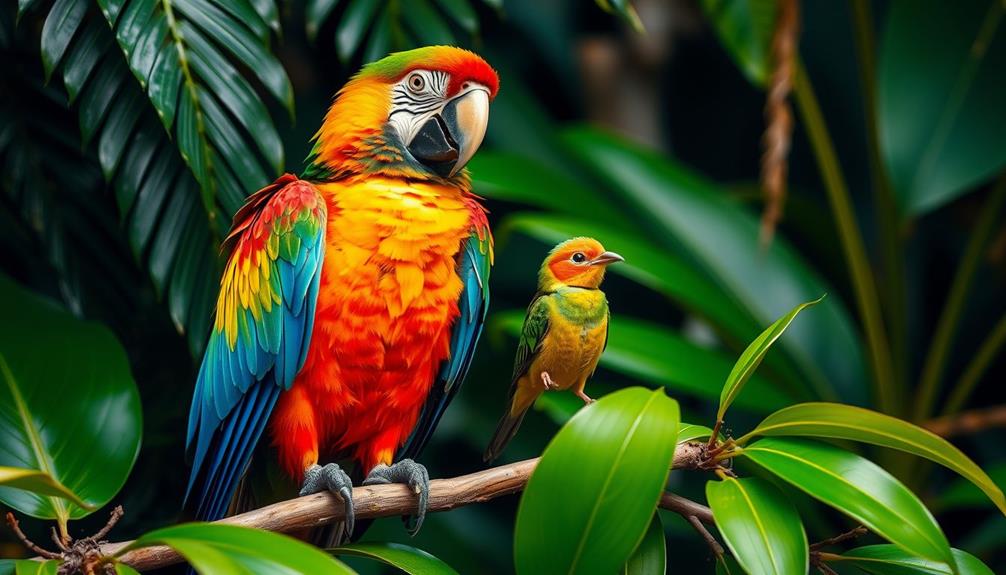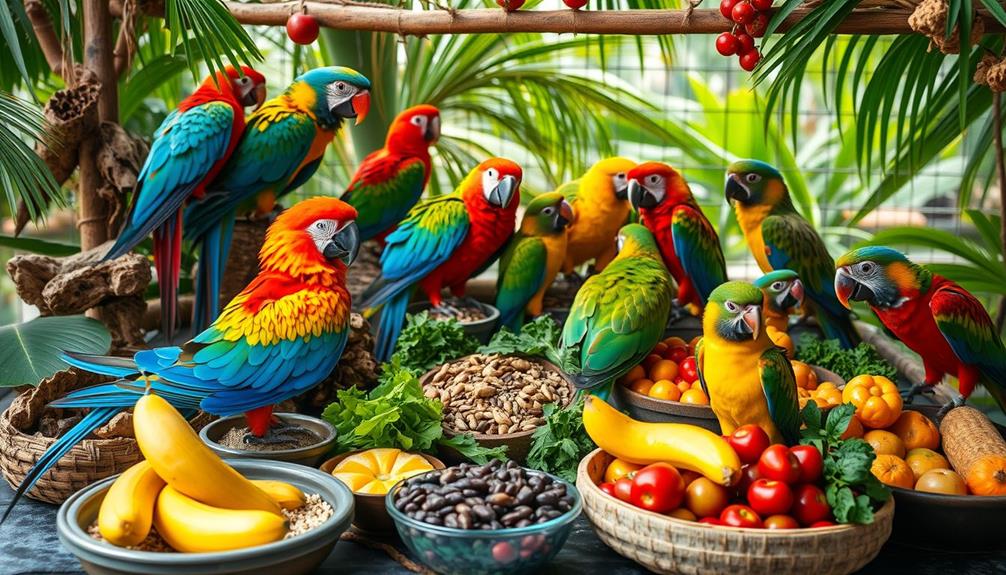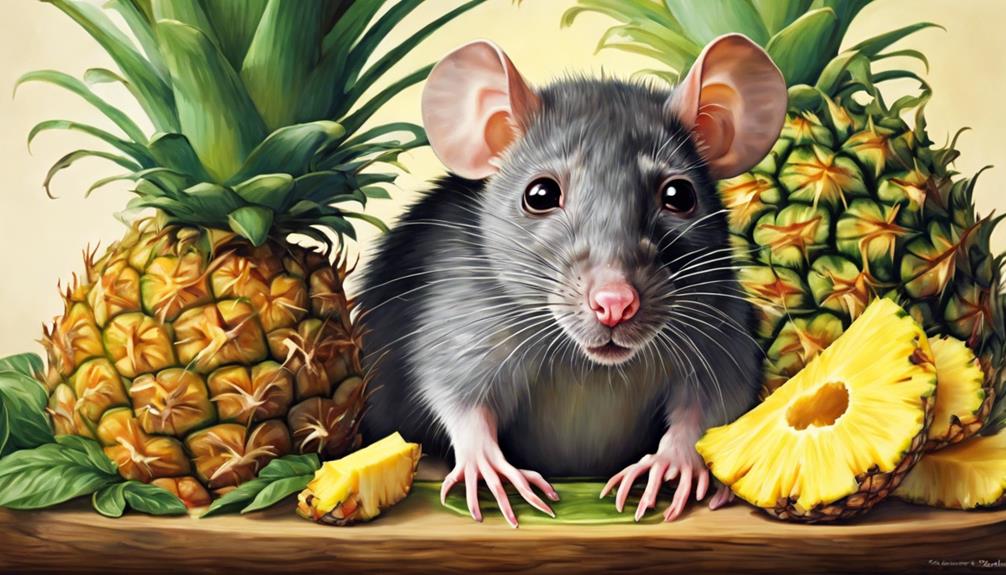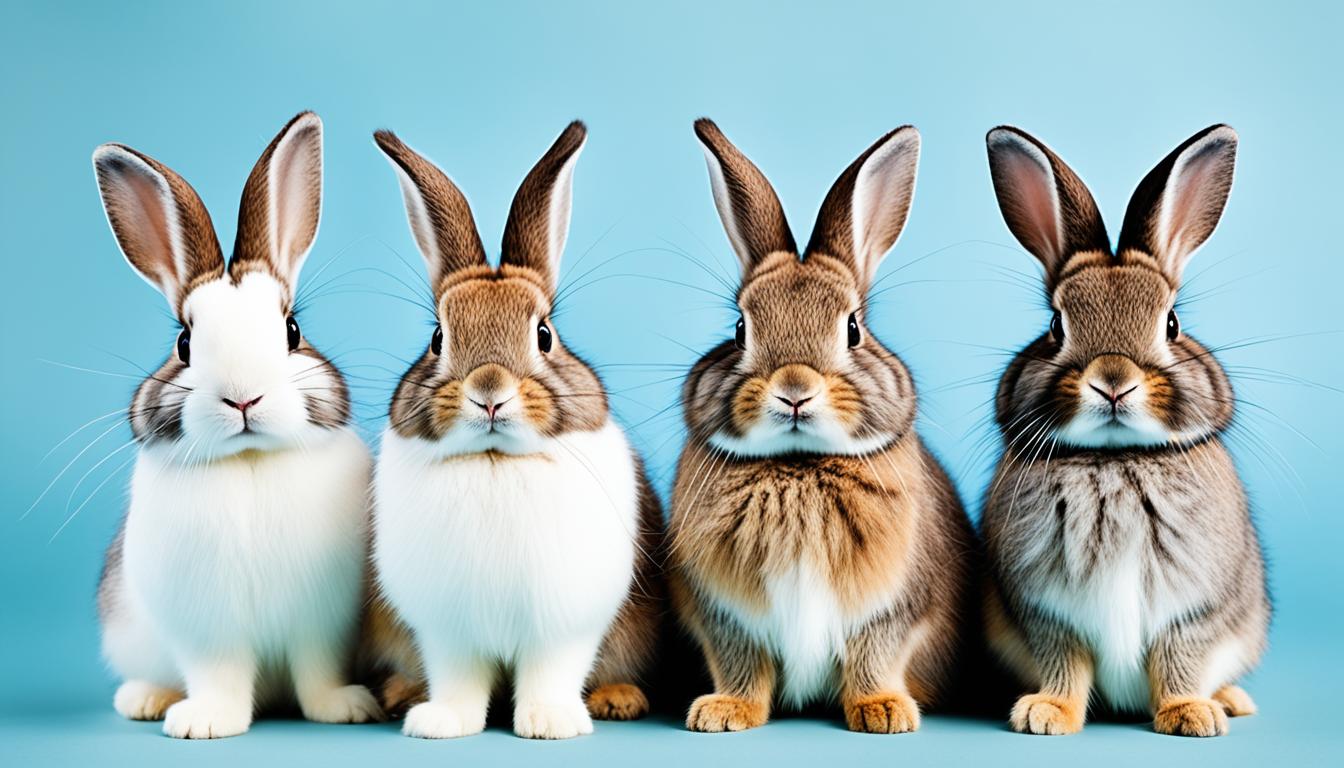When breeding exotic birds, you need to grasp their specific requirements. Start by understanding their breeding seasons—many breed in spring and summer, while pet birds might breed year-round. Choose compatible pairs by evaluating temperament and ensuring they're at the right breeding age, usually 3-5 years. Create an ideal environment with a spacious, well-ventilated cage and suitable nesting materials. Provide a balanced diet, including calcium supplements during breeding. Monitor behaviors closely to catch any health issues early on. With the right knowledge, you'll set the stage for successful breeding, and there's so much more to explore on this topic!
Key Takeaways
- Exotic birds typically breed year-round in captivity, requiring proper nutrition, increased daylight, and a suitable environment for success.
- Selecting compatible pairs involves assessing temperament, breeding age, and genetic health to ensure peaceful and healthy offspring.
- A spacious and well-ventilated breeding cage with proper nesting materials is essential for creating an ideal breeding environment.
- Providing a balanced diet, calcium supplements, and fresh water supports the health of breeding birds and their chicks.
- Monitoring bird behavior and egg laying helps detect stress or nutritional issues, ensuring the well-being of both parents and chicks.
Understanding Breeding Seasons
Understanding breeding seasons is crucial for anyone interested in exotic bird breeding. While wild birds typically breed in spring and summer, pet birds can breed year-round, depending on environmental conditions and care.
You'll want to create an ideal environment to encourage breeding behaviors in your birds. Key factors include proper nutrition, increased daylight, and favorable weather. Additionally, awareness of dog health and nutrition can also influence your approach to breeding, as healthy birds require a balanced diet and proper care.
Common pet bird species like parrots, cockatiels, budgies, lovebirds, and finches each have specific breeding requirements that you should be aware of. During breeding seasons, hormonal changes can affect your birds' moods, leading to aggression and territorial behavior. Being prepared to manage these shifts is crucial for a harmonious home.
Understanding the incubation period is equally important for successful breeding and chick care. This period varies by species, typically lasting between 10 to 30 days.
Selecting Compatible Pairs

Selecting compatible breeding pairs is vital for successful exotic bird breeding. When you're breeding parrots, evaluating their temperament is essential to guarantee they can coexist peacefully.
It's also important to take into account how their personalities may influence the overall dynamics in the aviary, which can be related to how astrological compatibility affects attraction in relationships.
Here are key factors to take into account when selecting compatible pairs:
- Temperament: Look for birds that exhibit friendly and non-aggressive behaviors.
- Breeding Age: Aim for pairs aged 3-5 years to enhance the likelihood of healthy offspring.
- Avoid Inbreeding: Choose birds that aren't closely related to prevent genetic issues.
- Interactions: Observe their interactions before pairing to gauge interest and compatibility.
- Breeding Records: Keep detailed records of past breeding successes and challenges to inform future selections.
Creating an Ideal Environment

To create an ideal environment for your exotic birds, you need to focus on cage size and nesting materials. A spacious cage not only provides room for movement but also fosters a stress-free atmosphere for breeding.
Additionally, the selection of nesting materials can be influenced by cultural practices observed in various communities, as seen in Aboriginal art concepts. Choosing the right nesting materials, like wood shavings or paper, will help your birds feel secure and comfortable when they lay their eggs.
Cage Size Requirements
When considering cage size for your exotic bird breeding pairs, it's vital to provide a spacious environment that promotes comfort and movement. The minimum size recommended is 24"x24"x36", allowing your birds enough room to fly and engage in natural behaviors.
Additionally, making sure that the cage is free from harmful substances understanding toxicity to cats from ferns is essential for the safety of other pets that might be in the same environment.
To create the ideal cage setup, keep these key points in mind:
- Ensure proper ventilation to prevent respiratory issues.
- Include perches, food and water dishes, and a nesting box for their comfort.
- Place the cage in a quiet area, away from high traffic, to foster a secure breeding environment.
- Commit to regular cleaning and maintenance to reduce stress and health risks for your birds.
- Monitor the cage conditions to guarantee a healthy atmosphere for the breeding pairs.
Adhering to these cage size requirements and guidelines will help you create a nurturing environment for your exotic birds.
This promotes not only their well-being but also the success of their breeding efforts. Remember, a happy and comfortable bird is more likely to thrive and produce healthy chicks!
Nesting Materials Selection
Creating a cozy and secure nesting space for your exotic birds is vital for their breeding success. Choosing the right nesting materials can greatly impact the comfort of your breeding pairs and the health of their future chicks. Suitable options include wood shavings, paper, and grasses, which not only provide comfort but also encourage natural behaviors, allowing your birds to create a space that feels safe and familiar.
Incorporating natural materials, similar to modern farmhouse decor trends, can also enhance the environment for your birds, making them feel more at home.
Make sure your nesting boxes are easily accessible and made from non-toxic materials to support a healthy environment for egg-laying and chick rearing. Regularly inspecting materials is essential; replace them as needed to maintain cleanliness and prevent any buildup of bacteria or parasites that could harm your birds.
Keep in mind the specific preferences of the bird species you're breeding, as different species may have distinct requirements for nesting materials and box types. By providing a variety of nesting materials, you give your exotic birds the freedom to choose what best suits their needs, ultimately leading to a successful breeding experience.
Essential Breeding Equipment

Setting up a successful breeding environment for exotic birds depends on having the right equipment.
You'll need to provide a comfortable and safe space for your breeding pairs and their future chicks. For instance, consider the importance of maintaining a clean environment, similar to how hair treatments for damage can restore health in other areas.
Here's a list of essential breeding equipment:
- Breeding Cage: Make sure it's spacious, clean, and well-ventilated to accommodate both birds and their chicks.
- Nesting Boxes: Choose safe, cozy boxes that are easily accessible for egg-laying, filled with suitable nesting materials like wood shavings or grasses.
- Incubators: These are vital for maintaining ideal temperature and humidity for the eggs, promoting successful hatching.
- Brooders: Essential for providing warmth and comfort to newly hatched chicks, helping them thrive in their early development stages.
- Food and Fresh Water: Regularly supply adequate food and fresh water, along with enrichment activities to support the health and well-being of your birds.
Nutrition for Breeding Birds

Nutrition plays an essential role in the success of breeding birds, directly impacting their health and the development of their chicks. A balanced diet should include high-quality pellets, fresh fruits, and vegetables, guaranteeing they get the essential nutrients needed for reproduction.
During breeding season, providing calcium supplements is critical, as deficiencies can lead to soft eggs and other reproductive issues. Additionally, incorporating mindful eating practices can help guarantee that breeding birds receive the necessary nutrients without overfeeding. Regular physical activity also supports their overall health during this demanding time.
Make certain to offer fresh water daily and change it frequently. Proper hydration is crucial during the increased activity levels associated with breeding.
Be cautious about what you feed your birds; avoid fatty, salty, or sugary foods, as these can negatively affect their health and breeding success.
It's also important to keep an eye on your birds. Monitoring bird behavior can help you spot changes in appetite or activity levels, which may indicate nutritional deficiencies or health concerns that need addressing.
Managing Egg Laying

After ensuring your breeding birds receive the right nutrition, it's time to focus on managing egg laying effectively. Understanding clutch sizes and the incubation process is essential to ensuring a successful breeding cycle.
Additionally, maintaining a clean environment for your birds can reduce stress and improve their overall health, which is vital during the breeding period. Regularly cleaning their habitat can also minimize the risk of diseases, similar to how key factors in choosing a home cleaning service can affect your living space.
Here are some key considerations:
- Clutch Sizes: Most exotic birds lay between 2 to 6 eggs per breeding cycle.
- Egg Incubation: Incubation periods usually last 21 to 30 days, with the female primarily responsible for keeping the eggs warm.
- Environmental Factors: Light and temperature greatly influence egg-laying timing and the health of the eggs.
- Monitoring Laid Eggs: Regularly check for any broken or soft eggs, which may indicate stress or nutritional deficiencies.
- Preventing Unwanted Egg-Laying: Remove nesting materials and food bowls when breeding isn't intended to discourage unnecessary nesting behavior.
Caring for Chicks

Once your chicks hatch, they need immediate warmth and nutrition from their parents.
It's essential to create a safe and stimulating environment for them, as the importance and benefits of play extend to young birds, promoting their physical and cognitive development.
You should closely monitor their health, ensuring they're gaining weight and developing feathers as they grow.
Regularly checking their environment and feeding habits helps keep them healthy during this vital stage.
Feeding and Nutrition
Caring for chicks involves understanding their unique feeding needs, especially in those vital early weeks. Proper nutrition is fundamental for their growth and development, and it starts with the parent birds. A well-balanced diet for them, which includes high-quality pellets and fresh fruits and vegetables, guarantees they provide the right nutrients to their chicks.
It's significant to acknowledge that just as with vegan diets, a diverse range of nutrients is essential for peak health.
As you care for your chicks, keep these feeding tips in mind:
- Offer soft, easily digestible foods as they begin sampling solids around 3-4 weeks.
- Monitor their weight and growth rate; healthy chicks typically gain about 10-15% of their body weight daily.
- Confirm fresh water is always available and changed frequently to maintain hydration.
- Introduce a variety of fresh fruits and vegetables to encourage diverse nutrition.
- Be patient during the weaning process, as it can take time for them to adjust.
Health Monitoring Tips
Monitoring the health of your chicks is crucial for their well-being and development. Regular checks can help you catch any health issues early. Look for signs of distress, like lethargy or lack of vocalization. Confirm that your chicks are gaining weight consistently—aim for 10-15% of their body weight daily in the first few weeks.
To maintain a healthy environment, keep the nesting area clean. Poor hygiene can lead to infections affecting both chicks and parents. Pay attention to the feeding behavior of the parents; they should be providing sufficient regurgitated food, which is essential for the chicks' growth and development.
Additionally, monitor the chicks' droppings. Changes in color or consistency could indicate health problems that might require veterinary intervention.
Here's a quick reference table to help you track their health:
| Health Aspect | What to Watch For |
|---|---|
| Weight Gain | 10-15% daily increase |
| Feeding Behavior | Adequate regurgitated food |
| Droppings | Changes in color or consistency |
| Nesting Hygiene | Clean environment to prevent disease |
Frequently Asked Questions
What Do I Need to Be a Bird Breeder?
To be a bird breeder, you'll need compatible pairs, a clean and spacious environment, nesting boxes, and proper food. You must monitor their behavior and understand their specific care requirements for successful breeding.
How Do You Prepare Birds for Breeding?
To prepare your birds for breeding, guarantee they're healthy and compatible, create a spacious and clean environment, provide appropriate nesting materials, and maintain a balanced diet to support their needs during this critical time.
What Questions Should I Ask a Bird Breeder?
When you're evaluating a bird breeder, ask about their experience, parent birds' health, specific species traits, living conditions, and post-sale support. Understanding these factors guarantees you're making a well-informed decision about your future pet.
How Profitable Is Bird Breeding?
Bird breeding can be quite profitable, especially with popular species like African Greys and Macaws. However, initial investments and knowledge in genetics are essential. New breeders might struggle initially, but experienced ones see better returns.
Conclusion
In the enchanting world of exotic bird breeding, you've started a journey much like Noah's, gathering pairs and nurturing life. By understanding breeding seasons, selecting compatible mates, and providing the right environment, you're setting the stage for success. Remember, patience and care are key, as you watch your feathered friends flourish. So, spread your wings and plunge into this rewarding adventure, knowing that every effort you make brings you closer to avian harmony.









